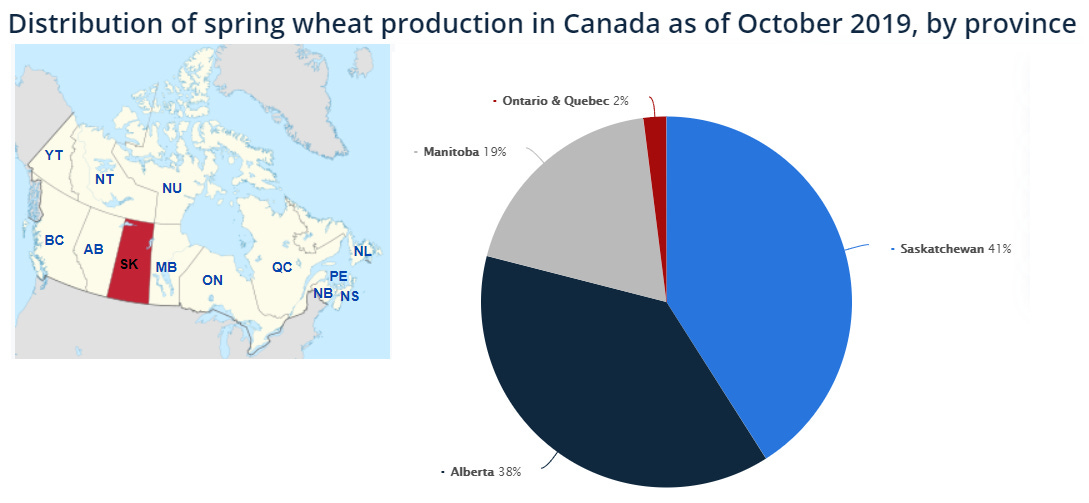Insightful newsletter of Drishtikone: Issue #248 - Power of Agri Monopolies
Canadian politicians and PM were backers of those who attacked India on the Farm Bills. Just in the last decade, both Canada and Australia repealed their agri monopolies. Take a look.
Photo by Mahir Uysal on Unsplash
“Beware that, when fighting monsters, you yourself do not become a monster... for when you gaze long into the abyss. The abyss gazes also into you.” ― Friedrich W. Nietzsche
Monopoly in any area - with power concentrated in the hands of select group or individuals - is always a recipe for corruption and abuse. Always. But the impact of that monopoly simply multiplies when it is in the area of food and agriculture.
India has seen multiple times how hoarding of some food products has brought pain to the normal public. The Onion price rise of 2013-14 (Source) showcased that in recent times as did unexplainable price rise for products like rice after a record production! (Source)
So when the farmers were toiling hard to create record harvests, how was the consumer paying rising prices for food?
Hoarding.
By “traders and middlemen” who had created monopolies in India. Same people who will wield swords against a police force which is not fighting. All while shamelessly mouthing the names and words of the Gurus!
But is this vile drama preserve of India alone? Or have other countries seen this kind of dynamics in agriculture as well?
Well, when we went digging, we found that Canada, of all the countries (thank you very much male bimbo Trudeau!), had the most powerful agriculture monopoly in Canada Wheat Board. Ditto for Australia. They had to be closed up when they were hindering growth or were mired in scandals of international proportions.
Their power was extraordinary. Their demise painful. Lets take a look.
(It is just astonishing that not one media person in India or in the foreign publications, specifically in the US (which was pushing for abolishing of CWB) and Canada has even mentioned this not so distant past examples and their lessons! Further shows how utterly clueless and compromised this whole cabal is!)
Tuhaada (your) law, freedom; Saada (our) law, repression?
The Khalistani elements in Canada are willing to go to any length to whip up the so-called farmers’ protests in any way they can. So a week back they went out in the blistering cold to protest against the Indian government in the province of Saskatchewan!
Nothing new in that. Except that the province’s state leadership wasn’t that sympathetic to them.
Saskatchewan Premier Scott Moe was very clear about how from personal experience he knew that the farm laws brought by India were the right step forward.
"As painful and challenging as the discussion is in India, I think Saskatchewan can provide an example of moving through the years away from sustenance agriculture to producing more and decreasing your risks of lack of food in your community and in your country, and ultimately moving toward a market-based agriculture system that provides opportunities for higher production and sustainability," said Moe. (Source)
What was he talking about?
Canadian Wheat Board - monopoly over wheat marketing
You see, even Canada had its version of APMC - the Canadian Wheat Board. It was discontinued in 2012 when it was made into a voluntary organization.
The Canadian Wheat Board (CWB) was an agricultural marketing board headquartered in Winnipeg, Manitoba. Established in 1935, for much of its history it was the sole buyer and seller of Prairie wheat and barley destined for export from Canada or for human consumption in Canada. Referred to as the “single desk,” under this model it was illegal for farmers to sell their grain to anyone other than the CWB. Following a change in government policy, the single-desk model was discontinued in August 2012, and the CWB became a voluntary marketing organization. In July 2015, G3 Global Grain Group purchased a majority stake in the CWB, creating a new firm called G3 Canada Ltd. The company’s headquarters remain in Winnipeg. (Source)
Before we go ahead, it is important to understand the contribution of Saskatchewan in the overall wheat production by Canada. It is the highest wheat-producing province.
Changes were made to the Marketing Freedom for Grain Producers Act and passed into legislation in December 2011 which enabled the government to repeal the CWB Act and making CWB into a voluntary marketing organization while abolishing the single-desk model. (Source)
There was a huge controversy backed by vested interests in Canada who profited from that system. But the leadership went ahead and the benefits are becoming obvious now.
More than $200 million has been invested in agricultural handling facilities in Hamilton since 2008, marking a renaissance of sorts for the city known as Steeltown even decades after the metal industry began slumping. Like any economic rebirth, it is hard to point to one single catalyst. But the privatization of the Winnipeg-based Canadian Wheat Board four years ago and 2,000 kilometres away certainly stands out as one. The upshot of that controversial decision is a rapidly changing grain transportation network that is affecting Canadian farmers, grain handlers, railways and ports from the West Coast to the Arctic and the St. Lawrence Seaway. (Source)
The attempt to abolish the CWB Act wasn’t easy. In 2006 during the Stephen Harper government, there was a gag order on the Board directors and staff from spending a penny to defend the single-desk system, which was hugely unpopular for obvious reasons. (Source) Talk about restrictions on freedom to express!
When the CWB was repealed in 2011, some pro-Canadian Wheat Board farmers “dumped a tonne of wheat in front of Brandon-Souris Conservative MP Merv Tweed's office.” (Source)
Australian Wheat Board - the Aussie monopoly and scandal
Canada is not the only country with a single-desk model that dominated the agricultural market. Even Australia had an Australian Wheat Board - a very powerful single-desk regime under the Australian government which alone could export Australian wheat. In the mid-2000s, it was involved in massive corruption scandals.
For much of the 20th and early 21st century, it was an Australian Government entity operating a single desk regime over Australian wheat, meaning it alone could export Australian wheat, which it paid a single price for. In the mid-2000s, it was found to have been, through middlemen, paying kickbacks to the regime of Saddam Hussein, in exchange for lucrative wheat contracts. This was in direct contradiction of United Nations Sanctions, and of Australian law. AWB delivered 90% of the Iraqi wheat market, before its practices were questioned in 2005. (Source)
That is when the AWB met its end.
Ills of agri monopolies
The Canadian Wheat Board did not do what its Australian counterpart was doing - violate international laws - but the lawless and monopolistic nature of that entire setup was being exposed for quite some time. Check out these allegations made by one reader in a Saskatchewan daily. (Source)
CWB is a monopoly, a licence for incompetence and corruption.
The voting for CWB monopoly directors is controlled by and manipulated by the CWB monopoly, the CWB is able to rig every election.
A contract with the CWB monopoly is totally one sided; the CWB monopoly is able to pt out at any time, without cost or penalty, whereas the farmer is subject to severe penalty for not honouring the CWB monopoly contract.
Do they sound familiar with what we saw in India with the Agricultural Produce Marketing Committees (APMCs)?
And, it is not just the Indian APMCs that were so powerful, such monopolistic bodies in agriculture do tend to usurp power since they hold the key to food supply to the nation.
The Canadian Wheat Board was so powerful, for example, that it was beyond the purview of even the country’s Freedom of Information provisions. One of the only three agencies to have that privilege!
CWB is one of only three government bodies exempted from Canada's equivalent of the U.S. Freedom of Information Act. The other two are Atomic Energy of Canada and the Canadian Security Intelligence Service; not even the Royal Canadian Mounted Police is as secretive as the wheat board. The CWB justifies its exemption by saying it's a commercial concern that doesn't consume tax money. Maybe, but it's still the beneficiary of a government monopoly. (Source)
The monopolistic nature that the Australian Wheat Board (AWB) and the Canadian Wheat Board (CWB) enjoyed was exactly what gave so much power to the APMCs and the Mandi system.
A peak into the history of APMCs
More importantly, the APMCs are the vestige of British Colonial rule. The British used this whole setup to fleece the farmers and continue to build the monopoly of their finished products by taking the farm produce at assured low prices.
A little detail on these bills: The old farm produce laws (the creation of the Agricultural Produce Marketing Committee (APMC) came into existence almost 150 years ago to feed the colonial masters raw cotton for their Manchester mills. The output of these mills was then sold to the “natives” for a hefty profit. The farmer was obligated, required, forced to sell to the masters in a regulated market whose regulation was set by, you guessed it, the colonial masters. It is very likely that the people blindly supporting the “poor” farmers (who were recently seen distributing expensive dry fruit freely to all those coming to their “protest”) are unaware of some simple facts. By supporting these very (relatively) rich farmers, the protesters are in fact arguing for the perpetuation of colonial rule. (Source)
These old colonial laws which perpetuate the same level of slavery albeit with different masters should have been brought down a long time back. The only reason they could not be dismantled was the immense wealth and power that these middlemen wield.
That is why it is quite ironic that the very laws that the Canadian establishment fought so hard to repeal are the ones their premier and political power groups are backing to be forced upon India! The Indian Farm Bills are akin to changes to Marketing Freedom for Grain Producers Act that were legislated in 2011 in Canada!
Would it be too much to ask for Indian farmers to also enjoy the same “Marketing Freedom” that the Canadian farmers got to since 2011?
Also please read Issue #232 - The Fake Farmers! to understand why those who were “protesting” were anything but farmers!
market corner: 10 quick bytes
20 projects worth Rs 363.4 crore sanctioned for infrastructure and expansion of food processing - more
Twitter Voice Messages feature being rolled out to Android, iOS users in India, Brazil, and Japan - more
India’s biggest Tunnel Boring Machine is building the Mumbai Coastal Road project to link South Mumbai to the end of Worli, of the Worli-Bandra Sea Link through a high-speed corridor - more
Cabinet approves over Rs 12,000-cr PLI scheme for telecom sector - more
Govt to infuse Rs 1,500 cr into Exim Bank next fiscal - more
Govt recognized startups jump 85X in 4 years. The latest overall tally of recognized startups as of February 17, 2021, has crossed the 44,000-mark - more
Indians are using lesser sanitizers and fewer masks - more
India's aging dams pose a safety risk, the nation must conduct reviews: Study - more
Ford's Europe car lineup to be all-electric by 2030 - more
India to be among fastest-growing emerging economies in FY22, rating hinges on the deficit, debt: S&P - more
nota bene
Terror “Climate” backing doubles down: On February 17, Khalistani terrorist organization Sikhs For Justice’s (SFJ) Gurpatwant Singh Pannu came out in support of several so-called activists who were recently arrested for their participation in anti-India activities including Disha Ravi, Deep Sidhu, Nodeep Kaur, Nikita Jacob, and others. He said that his organization had created a website in support of these accused. (Source)
Height of Pappuism: Rahul Gandhi termed fishermen as the 'farmers of the sea' while addressing a gathering in Puducherry on Wednesday and claimed that there was no ministry to address the grievances of the farmers of the sea and called for a department to be set up in Delhi - just like how farmers had their own department. However, the Department of Fisheries already exists under the Animal Husbandry ministry - Giriraj Singh is its minister. (Source)
Extra-marital solution: In what comes as a bizarre incident, the Jharkhand Police has asked a man to spend three days each with his wife and girlfriend to resolve the dispute between them. The police even gave him a day off. Rajesh Mahato, a resident of Kokar Tiril Road in Ranchi, got into a relationship with a girl despite being married, as par a Dainik Jagran report. However, he told the girl that he was single. He later left his wife and child to elope with the girlfriend. (Source)
Uighur Genocide: Canadian Prime Minister Justin Trudeau said on Tuesday that Canada and other countries are mulling labeling China's treatment of Uighurs a genocide. The comments come after former US President Donald Trump last month called the treatment of Uighurs living in China's Xinjiang genocide and crimes against humanity. (Source)
Plant-based Beef and Climate: Bill Gates wants wealthier nations around the globe to ditch eating beef and instead switch to lab-grown or plant-based alternative "meats" in an effort to combat climate change. The Microsoft co-founder sat down with MIT Technology Review to plug his new book, "How to Avoid a Climate Disaster," and provided his views on what possible solutions might be viable — or not. (Source)
Self-created Heist: After committing one of the "biggest blunders in banking history," Citibank won't be allowed to recover the almost half a billion dollars it accidentally wired to Revlon's lenders, a US District Court judge ruled. Citibank, which was acting as Revlon's loan agent, meant to send about $8 million in interest payments to the cosmetic company's lenders. Instead, Citibank accidentally wired almost 100 times that amount, including $175 million to a hedge fund. In all, Citi (C) accidentally sent $900 million to Revlon's lenders. (Source)
video corner: Kerala’s ancient archer
Govindan is an archer in the Wayanad hills who still practices archery the way it was done centuries ago. It was used for hunting in the past. He is a vegetarian now but the skills he learned are now simply show-cased to the visitors. A fascinating look at how the ancient skills in India may still be alive in some corners. Unfortunately, they may not live through to the next generation.
A fascinating video of how a representative of a tribe which fought against the British is now just a “show-piece” in the new world.
Today’s ONLINE PAPER: Check out today’s “The Drishtikone Daily” edition. - THE DRISHTIKONE DAILY
SUPPORT DRISHTIKONE: If you consider our work important and enriching and would like to contribute to our expenses, please click on the button below to go to the page to send in your contribution. You can select the currency (for example, INR or USD, etc) and the amount you would like to contribute. Contribute to Drishtikone
If you like this post - please share it with someone who will appreciate the information shared in this edition
If you like our newsletter, please share it with your friends and family






